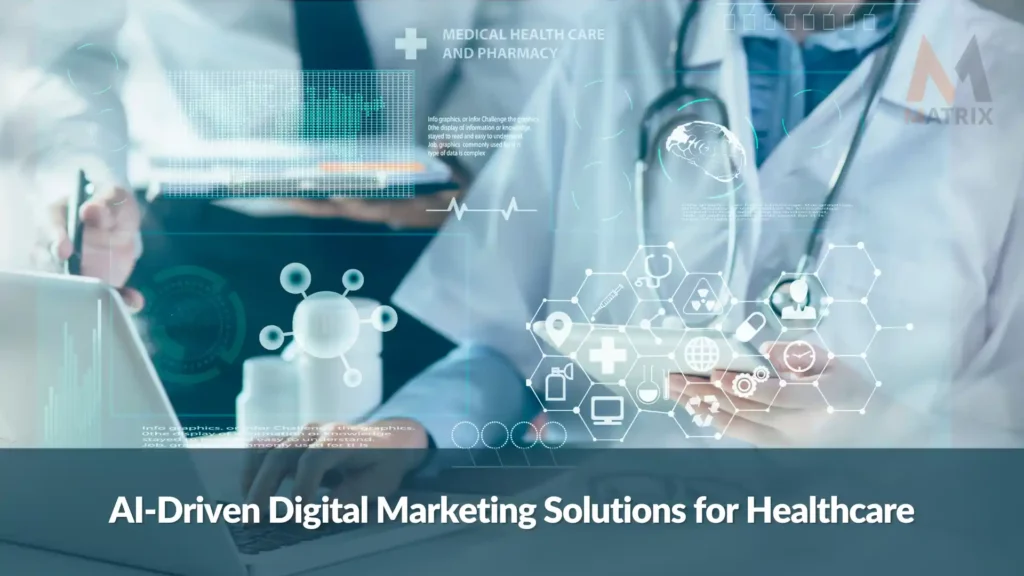AI-Driven Digital Marketing Solutions for Healthcare
Learn About AI-Driven Digital Marketing Solutions for Healthcare
AI-driven digital marketing solutions can play a vital role in the healthcare industry.
A doctor’s office with 50 staff members was inching ever closer to closing its doors. Cutbacks and a lack of patients made the future bleak until they partnered with Matrix Marketing Group, an AI-driven digital marketing agency.

The staff had heard stories of companies turning around their fortunes using AI solutions but worried that it was too expensive for their budget. However, Matrix worked out a deal that perfectly suited their needs.
The AI-driven digital marketing strategy worked like magic! Matrix used machine learning and data analysis to create custom content and target specific social media audiences.
They also used dynamic retargeting campaigns to draw customers into the doctor’s office. As the months rolled by, patient traffic increased exponentially, and the office was back in business again!
This new success story proves that AI-driven digital marketing solutions can bring life back into businesses of all sizes – even those with only 50 staff members. Our AI marketing platform with AI marketing automation saved the day.
Here are some potential ways that AI can be used to improve digital marketing efforts in the healthcare sector:
- Personalization: AI can help healthcare companies personalize their marketing efforts by analyzing user data and identifying behavioral patterns. This can lead to more targeted and effective marketing campaigns.
- Predictive Analytics: AI can analyze large amounts of data and predict future trends. Healthcare companies can use this information to tailor their marketing efforts to specific demographics or patient groups.
- Chatbots and Virtual Assistants: AI-powered chatbots and virtual assistants can provide patients with personalized information and answer their questions about healthcare products and services.
- Content Creation: AI can generate content for healthcare marketing campaigns, such as blog posts, social media updates, and email newsletters. This can save time and resources while ensuring the content is tailored to the target audience’s needs.
- Predictive Modeling: AI can create predictive models identifying potential patients likely to benefit from a healthcare product or service. This can help healthcare companies target their marketing efforts more effectively.
- Data Analytics: AI can analyze large amounts of data from various sources to identify trends and patterns in patient behavior. This information can be used to optimize marketing strategies and improve patient outcomes.
AI-driven digital marketing solutions can help healthcare companies deliver more personalized and effective marketing campaigns, improving patient outcomes and reducing costs. How to Choose the Right AI Digital Marketing Agency: A Comprehensive Guide for Marketing Managers
What are the challenges with marketing for healthcare companies?
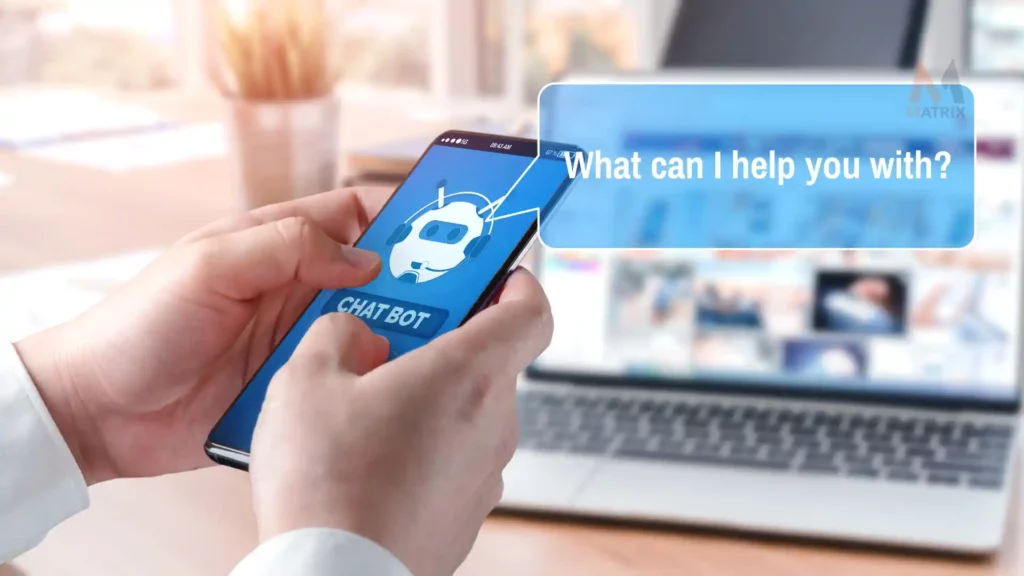
Marketing for healthcare companies can be challenging due to several factors, including:
- Regulatory Compliance: Healthcare companies must comply with a range of regulations and standards related to marketing, including the Health Insurance Portability and Accountability Act (HIPAA) and the Food and Drug Administration (FDA) guidelines. Failure to comply with these regulations can result in legal and financial consequences.
- Complex Messaging: Healthcare products and services often involve complex medical terminology and concepts that can be difficult to communicate clearly and understandably to patients and consumers.
- Privacy Concerns: Patients may hesitate to share their personal information with healthcare companies, particularly in light of recent data breaches and privacy scandals.
- Limited Budgets: Healthcare companies often need larger marketing budgets, which makes competing with larger, more established companies easier.
- Fragmented Market: The healthcare industry is highly fragmented, with many providers and products targeting different patient groups. This can make it challenging for healthcare companies to reach their target audience effectively.
- Trust Issues: Patients may be skeptical of healthcare companies due to concerns about the cost and quality of care and the potential for conflicts of interest between healthcare providers and insurers.
Addressing these challenges requires a strategic marketing approach that considers patients’ and healthcare consumers’ unique needs and concerns.
Effective communication, transparent messaging, and a commitment to privacy and data security are all key factors in building trust and credibility with patients and consumers.
Addressing these challenges requires a strategic marketing approach that considers patients’ and healthcare consumers’ unique needs and concerns. Effective communication, transparent messaging, and a commitment to privacy and data security are all key factors in building trust and credibility with patients and consumers. AI Marketing Plan for Manufacturing Businesses
How does AI Digital Marketing Service from Matrix Marketing Group help Healthcare Companies?
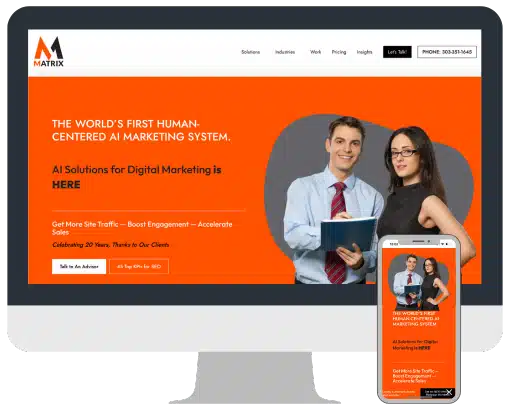
Matrix Marketing Group is a digital marketing agency that offers AI-driven solutions to help healthcare companies improve their marketing efforts. Here are some of the ways that their services can benefit healthcare companies:
- Personalization: Matrix Marketing Group uses AI to analyze user data and create personalized marketing campaigns tailored to individual patients’ and consumers’ needs and preferences. This can lead to higher engagement and conversion rates.
- Predictive Analytics: Matrix Marketing Group uses AI to analyze large amounts of data and identify trends and patterns that can inform marketing strategies. This can help healthcare companies to target their marketing efforts more effectively and predict future trends.
- Chatbots and Virtual Assistants: Matrix Marketing Group can develop AI-powered chatbots and virtual assistants to provide patients with personalized information and answer their questions about healthcare products and services.
- Content Creation: Matrix Marketing Group uses AI to generate high-quality content for healthcare marketing campaigns, such as blog posts, social media updates, and email newsletters. This can save time and resources while ensuring the content is tailored to the target audience’s needs.
- Data Analytics: Matrix Marketing Group uses AI to analyze large amounts of data from various sources to identify trends and patterns in patient behavior. This information can be used to optimize marketing strategies and improve patient outcomes.
Matrix Marketing Group’s AI-driven digital marketing services can help healthcare companies deliver more personalized and effective marketing campaigns, improving patient outcomes and reducing costs.
Their solutions are designed to address the unique challenges of marketing in the healthcare industry, including regulatory compliance, complex messaging, and limited budgets.
What is AI Personalization?

AI personalization uses artificial intelligence (AI) technology to tailor marketing content and experiences to individual users’ needs and preferences.
AI personalization algorithms analyze user data, such as browsing history, search queries, purchase history, and demographic information, to create a profile of each user’s interests and behaviors.
This data is then used to deliver personalized content, recommendations, and experiences across various marketing channels, such as websites, emails, social media, and advertisements.
AI personalization can improve the effectiveness of marketing campaigns by delivering content and experiences that are relevant and engaging to each user.
Personalized marketing can lead to higher engagement, longer session durations, and conversion rates.
AI personalization can help companies optimize their marketing strategies by identifying trends and patterns in user behavior and adjusting their campaigns accordingly.
AI personalization is increasingly used in various industries, including e-commerce, healthcare, finance, and entertainment, to deliver customized user experiences.
As AI technology advances, the possibilities for personalization are expected to grow, allowing companies to provide even more tailored and engaging experiences to their users.
What is AI Predictive Analytics for marketing?
AI predictive analytics for marketing uses machine learning algorithms to analyze large amounts of data and identify patterns and trends that can be used to predict future outcomes. These algorithms use historical and real-time data to predict future events or user behavior.
In marketing, AI predictive analytics can forecast trends and identify potential customer needs and preferences. By analyzing data such as user behavior, purchase history, and demographic information, predictive analytics can identify patterns and trends that can help marketers to optimize their campaigns and target their efforts more effectively.
For example, AI predictive analytics can be used to:
- Predict customer behavior: Predictive analytics can analyze customer behavior patterns to identify potential churn, upsell, or cross-sell opportunities.
- Forecast trends: Predictive analytics can analyze market trends and forecast future demand for a particular product or service.
- Optimize marketing campaigns: Predictive analytics can identify which marketing channels or campaigns are likely the most effective for a particular target audience, allowing marketers to optimize their efforts.
- Identify potential customers: Predictive analytics can analyze user data to identify potential customers likely to be interested in a particular product or service.
AI predictive analytics can help marketers to make more informed decisions, optimize their marketing strategies, and achieve better results.
Predictive analytics can provide insights that are difficult or impossible to obtain through manual data analysis by leveraging the power of machine learning algorithms. AI Digital Marketing Trends and Future for Matrix Marketing Group [Interview]
How Can AI Chatbots and Virtual Assistants Help the Healthcare Industry?
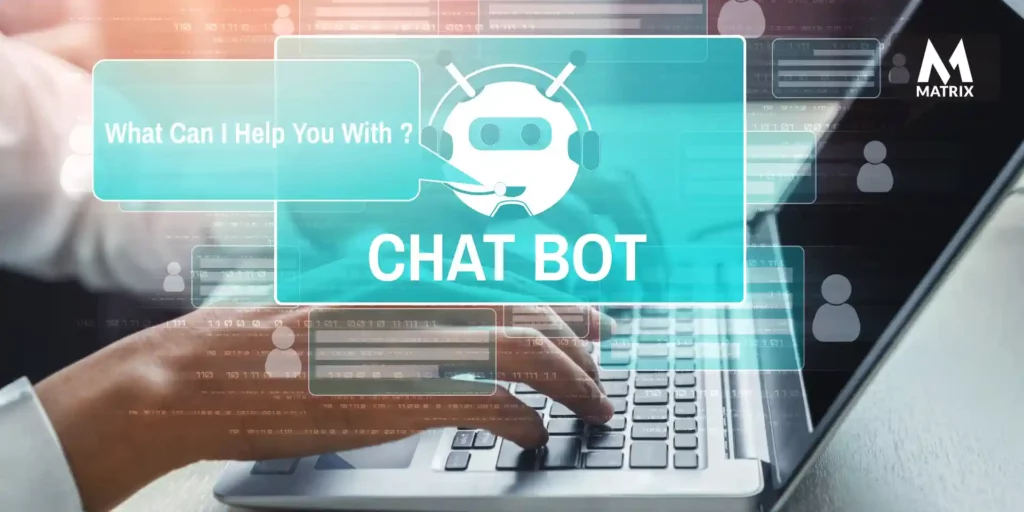
AI-powered chatbots and virtual assistants can help the healthcare industry in several ways:
- 24/7 Availability: Chatbots and virtual assistants can provide patients immediate assistance and support 24/7. This can be especially helpful for patients with questions or concerns outside regular office hours.
- Personalized Support: Chatbots and virtual assistants can use AI to analyze patient data and provide personalized support and recommendations. This can help patients to manage their health more effectively and make informed decisions about their care.
- Appointment Scheduling: Chatbots and virtual assistants can help patients schedule appointments, reducing wait times and improving patient satisfaction.
- Medication Management: Chatbots and virtual assistants can remind patients to take their medications, track their symptoms, and provide guidance on managing side effects.
- Health Education: Chatbots and virtual assistants can provide patients with information and resources on various health topics, such as diet and exercise, mental health, and chronic disease management.
- Cost Savings: Chatbots and virtual assistants can help healthcare providers save costs by automating routine tasks and reducing manual labor.
Chatbots and virtual assistants powered by AI technology can help the healthcare industry to deliver more personalized and effective care while reducing costs and improving patient outcomes.
Providing patients with immediate access to information and support can improve patient satisfaction and reduce the burden on healthcare providers.
5 AI Content marketing examples with healthcare companies

Here are five AI content marketing examples used by healthcare companies:
- Johnson & Johnson’s BabyCenter: BabyCenter is a website owned by Johnson & Johnson that provides resources and information for parents on topics such as pregnancy, childbirth, and parenting. The website uses AI technology to analyze user data and provide personalized recommendations for content and products based on each user’s interests and preferences.
- Merck’s Oncology Assistant: Merck’s Oncology Assistant is an AI-powered chatbot providing personalized support and resources for cancer patients. The chatbot can answer questions about cancer treatments, provide tips for managing side effects, and connect patients with support groups and resources.
- Cleveland Clinic’s Health Essentials: Health Essentials is a blog owned by the Cleveland Clinic that provides health news and information on various topics. The website uses AI technology to analyze user data and provide personalized recommendations for content based on each user’s interests and preferences.
- Healthgrades’ PatientMatch: PatientMatch is an AI-powered tool that helps patients find the right healthcare provider based on their needs and preferences. The tool uses machine learning algorithms to analyze patient data and match them with providers likely to meet their needs.
- Novartis’ MS Assistant: MS Assistant is an AI-powered chatbot that provides support and resources for patients with multiple sclerosis. The chatbot can answer questions about MS treatments, provide tips for managing symptoms, and connect patients with support groups and resources.
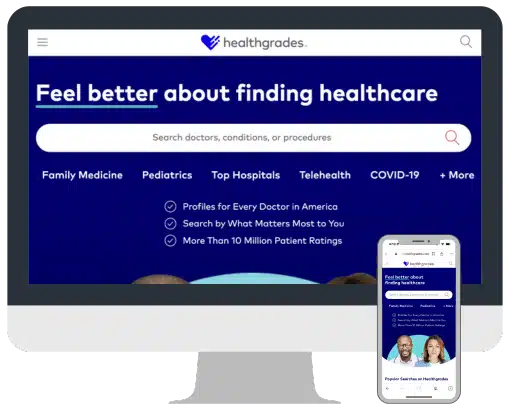
These examples show how AI technology can create personalized and effective content marketing strategies in the healthcare industry.
By analyzing user data and providing personalized recommendations and support, these companies can more effectively engage with their audiences and improve patient outcomes.
An effective model for creating content marketing strategies in the healthcare industry is partnering with Matrix Marketing Group.
For example, Novartis’ MS Assistant chatbot helps raise awareness about multiple sclerosis treatments and resources, showing patients that help is available.
The AI-powered chatbot increases interest by providing tips and information on managing symptoms. This leads to a desire to take action and utilize the services provided through the chatbot. With personalized support, Novartis can improve patient outcomes and engage with its customers more effectively. How to Use AI Digital Marketing to Transform Your Marketing Results
The same holds for other AI-powered solutions in the healthcare industry. By using machine learning algorithms to analyze patient data, companies can match them with providers likely to meet their needs.
This creates personalized recommendations tailored specifically to each user, which increases engagement and leads users to take action.
Free ai tools for marketing are nothing like the AI marketing tools we use at Matrix Marketing Group.
By understanding how AI technology can create effective strategies in the healthcare industry, companies can leverage this knowledge and use AIDA principles to craft persuasive content marketing campaigns that drive consumer engagement and ultimately improve patient outcomes.

George Schildge
Managing Director USA
George Schildge is an entrepreneur, business executive, and marketing expert based in Denver, Colorado, USA. He is the founder and CEO of Matrix Marketing Group, a full-service digital marketing agency specializing in AI-driven marketing solutions for businesses of all sizes.
Schildge has over 25 years of experience in marketing, sales, and business development. Before founding Matrix Marketing Group, he held various executive positions at technology companies like Baan, IBM, and Sun Microsystems.
Under Schildge’s leadership, Matrix Marketing Group has become a leading provider of AI-powered marketing solutions, helping businesses across a wide range of industries to improve their marketing strategies and achieve better results. The company has received numerous awards and recognitions for its innovative approach to digital marketing, including being named one of the Top 10 Marketing Automation Solution Providers by Marketing Tech Insights in 2022.
In addition to his work at Matrix Marketing Group, Schildge mentors and advises startups and entrepreneurs, sharing his expertise and insights on marketing, sales, and business strategy. He is a frequent speaker at industry conferences and events and has authored numerous articles and blog posts on marketing and business topics.
George Schildge is a respected leader and innovator in the digital marketing industry. He is known for his expertise in AI-driven marketing solutions and his commitment to helping businesses achieve their marketing goals.
General FAQs about AI digital marketing
Why is AI digital marketing important?

AI digital marketing is important because it allows companies to create more personalized and effective marketing campaigns. By analyzing user data and using machine learning algorithms to predict user behavior, AI can help companies deliver targeted messaging and experiences more likely to resonate with their audience.
How can AI digital marketing improve ROI?

AI digital marketing can improve ROI by identifying the most effective marketing channels and strategies for a particular audience. By analyzing user data and predicting user behavior, AI can help companies optimize their marketing efforts and achieve better results with less investment.
Can AI digital marketing save time and resources?

AI digital marketing can save time and resources by automating routine tasks and processes. For example, AI can generate content, analyze data, and optimize campaigns, all of which can help reduce the need for manual labor and streamline marketing operations.
Is AI digital marketing relevant to all industries?

Yes, AI digital marketing is relevant to all industries, as it can help companies understand their audience better and deliver more targeted and effective marketing campaigns. However, the specific applications of AI may vary depending on the industry, and some industries may require more specialized expertise in AI technology.

